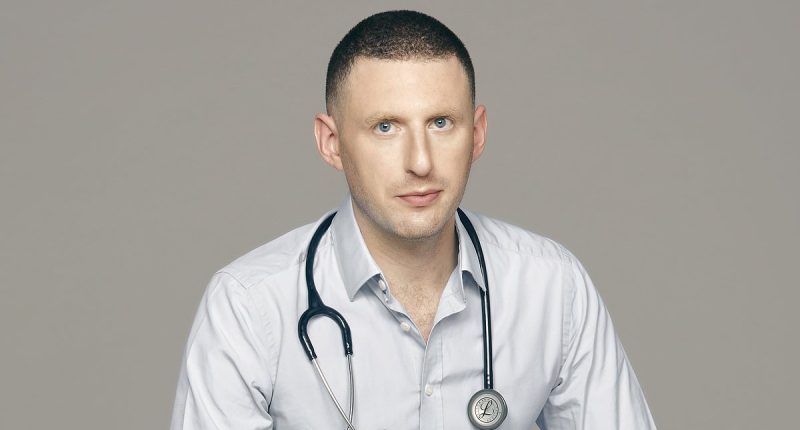Share this @internewscast.com
I had no idea. This is the response I hear time and time again from family when they are told that a relative or partner is taking ketamine. I work in a service for patients who have emerging severe mental illness and many of them have used drugs such as ketamine which has triggered psychosis or other serious mental health problems.
In A&E, I have frequently seen young people brought in having taken too much of the drug and fallen unconscious.
Yet their parents are often utterly oblivious that their child is taking this substance. It has become incredibly popular among twentysomethings, but older people remain clueless.
To be frank: The chances are, if you have young people in your life you probably know someone who has taken it, you just don’t realise it.
Not long ago I was on call in A&E late at night. During a lull, I started talking to a group of junior doctors. They were all in their mid-20s and had recently graduated. The conversation moved on to drugs. To my astonishment, half of them confessed they had tried it (although none admitted to still using it).

When someone has taken ketamine, it may seem like they are drunk, but they’re often slower, harder to engage, appear more distressed or confused, and obviously won’t smell of alcohol
These are highly educated, privileged people who really should know better. Ketamine has now become the drug of choice on university campuses, yet when I was a medical student 25 years ago, I’d never heard of anyone taking it.
So it came as no surprise when I read an alarming report suggesting it has now become a ‘rite of passage’ in many schools.
In a recent interview, Mark O’Hagan, a headteacher of Sacred Heart Catholic Academy in Crosby, a relatively affluent suburb of Liverpool, warned about ketamine use by children.
He said: ‘Six or seven years ago, we didn’t really know what ketamine was. Now, it’s in the common language of the children and for lots of children they do, unfortunately, see this as almost like a rite of passage. It’s seen as just a normal thing to do’.
What a sorry state of affairs that this dreadful, hateful drug has gripped the younger generation in the way it has.
But there’s no point in simply wishing it was different and putting our heads in the sand. I think it’s absolutely vital that every parent, grandparent, auntie and uncle knows about this drug. As sad as it might be, you simply cannot remain ignorant about what it is, its effects, and how to spot the signs that someone is using it.
Ketamine – which is also called ket or special K – is sometimes referred to as a horse tranquilliser and when taken in small doses it induces a sense of euphoria and a light, relaxed sensation.
It is a white powder that is usually snorted – often in a ‘bump’ (a small amount on the end of a key or off a fingernail). It was actually first used as an anaesthetic during the Vietnam war. I often see patients in a ‘k-hole’. This is when they have become detached from reality, trapped inside their own body, aware but unable to move or communicate. They dissociate and can hallucinate. It can be a terrifying experience as they are temporarily unable to interact with other people and can feel like they are no longer in their body.
Time is grossly distorted – hours pass yet feel like only a few minutes. Not everyone experiences this, of course, but you only have to stand in A&E for a few hours at a weekend and you will see people being brought in in this state. K-holes are often laughed about and many people don’t realise that the person is just a breath away from dying.
It is incredibly dangerous (indeed, Matthew Perry, the Friends star, died from the effects of ketamine).
Ketamine is well known for causing severe bladder problems. It has been estimated that about one in five users experiences some kind of troublesome urinary symptoms, although one study from Spain found that it was nearly half of all users. Problems include ulcerative cystitis and contracted bladder.
Open sores inside the bladder cause severe abdominal pain, blood in the urine and frequent, desperate trips to the toilet. Ketamine can make your bladder shrink in size to that of a toddler – and this can be permanent. I’ve seen two patients who have attempted suicide because of the pain – and tragically many users resort to using ketamine more often to cope with the pain, creating a vicious cycle.
If that wasn’t enough, it can also cause long-term problems with memory, attention and thinking and make people more likely to become paranoid and see and hear things that aren’t there.
It’s cheap and there’s some medical interest that, when prescribed properly, it can help with depression. This is still quite experimental and not at all a mainstream treatment, but it helps to give it an air of legitimacy.
However, if you are worried about a relative or friend, the signs that someone has taken it include: Disorientation, difficulties breathing, nausea, vomiting, hallucinations, slowed movement, difficulties thinking or responding, numbness in limbs, high heart rate and blood pressure, slurred speech and difficulties walking.
When someone has taken ketamine, it may seem like they are drunk, but they’re often slower, harder to engage, appear more distressed or confused, and obviously won’t smell of alcohol.
If you are worried, call an ambulance. I’d encourage everyone to educate themselves about ketamine and talk to the younger members of their family about it.
It is now worryingly normalised and many young people I talk to have no idea about the risks.
Fear stalks Jennifer’s A-list life

Jennifer Aniston’s £15million Bel Air mansion in LA was broken into by a stalker this month
You might look at a celebrity like Jennifer Aniston and think she has it all: Fame, wealth and beauty. But goodness, what an awful time she’s had with this stalker who broke into her £15million Bel Air mansion in LA earlier this month.
It has now been reported that she has been so shaken by the ordeal, she is relocating to a renovated house in Montecito. Who can blame her. Where’s the joy in having a mansion if you don’t feel safe in it? The toll stalking can take on your life is huge.
Patients I’ve had who have been the victims of stalkers have told me how it starts to affect all aspects of their lives and makes them constantly cautious and mindful about what they are doing and where they are going. It’s utterly exhausting. I hope Ms Aniston finds peace in her new home. It’s no use having it all if you can’t relax when you close your front door.
There was a touching story in the news recently about a Brazilian couple who had been married for 74 years and died on the
same day. Odileta Pansani de Haro and Paschoal de Haro died aged 92 and 94, a few hours apart. He continued to care for his wife right up until the moment, at 7am on April 17, that she died. Then at 5pm, in the same room, he died too.
Medicine tells us the mind and the body are two separate entities. The evidence doesn’t quite support that. The mind clearly has far more power over the body than we give it credit.












